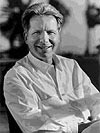

  |
|
|
||||||||||||||||||||||
|
FMS FEATURE... September 26, 2005 AFI's Film Music Favorites Come to Life Top 25 movie scores performed in splendor at the Bowl by Jon Burlingame  John Williams' Star Wars was named the top film score
of all time by the American Film Institute at an all-movie-music
concert Friday night, September 23, at the Hollywood Bowl in Los
Angeles. Billed as "The Big Picture—AFI's 100 Years of Film Scores,"
the one-night only program was presented in association with the Los
Angeles Philharmonic as part of the Institute's "100 Years"
celebration of motion pictures.
Anticipation was high because of the secrecy of the final list (visitors were banned from Friday's orchestra rehearsals, which are normally open to the public), foreseeing some spirited debates much like those which were generated by the eight previous "top 100" lists released by the AFI (including the top-song list announced in 2004). It was a near-sellout crowd, with 15,687 in attendance at the popular Southern California music venue, which can seat more than 17,000. None of the five surviving composers on the list attended, although members of the families of several deceased composers were present. Williams was the top composer with three scores on the list; Steiner, Herrmann, Goldsmith and Elmer Bernstein scored with two each. Veteran film-score observers were generally pleased with the cross-section of scores and composers represented. Steiner's King Kong was the earliest score on the list, Morricone's The Mission the most recent. Nine films won Academy Awards for their music, while five weren't even nominated for an Oscar. Film clips accompanied all of the performances; some were brief snippets, including title cards from the films, but many were extensive montages or, in some cases, entire scenes drawn intact from the films with excerpts from the original scores performed live. Mauceri began the program with a newly constructed six-minute suite from Newman's classic Americana score for How the West Was Won, performed while a stunningly edited collection of clips from 157 of the 250 nominated films played on the Bowl's giant television screens. The main themes from On Golden Pond and The Mission, and the finale from On the Waterfront, constituted the first of the evening's four medleys. Mauceri's eight-minute piece from Ben-Hur was the "Prince of Peace" scene where Charlton Heston's character encounters Jesus for the first time. The Pink Panther theme and an excerpt from A Streetcar Named Desire made an interesting, jazz-based medley: Mancini's stealthy tune was set to excerpts from the famous animated title sequences from the series, while North's bluesy score accompanied the sexy, iconic "Stella!" sequence featuring Marlon Brando and Kim Hunter. The longest sequence of the concert was a 10-minute piece from Goldsmith's avant-garde score for Planet of the Apes, encompassing the astronauts' search for water, discovery of the mute humans on the planet and their capture by the gorillas on horseback. The evening's most moving moments came next, with the theme from To Kill a Mockingbird performed to a montage of touching moments from the Gregory Peck classic. Mauceri and the orchestra then performed the entire finale of Sunset Boulevard, as the mad Norma Desmond (Gloria Swanson) descended the stairs to Waxman's demented tango. The final medley of the first half consisted of the theme from Out of Africa, the flying music from E.T., the opening music from King Kong and the theme from Vertigo (with the swirling shapes from Saul Bass' indelible main-title sequence projected onto the shell of the Bowl). Closing the first half was the last five minutes of The Adventures of Robin Hood, with the memorable duel between Errol Flynn and Basil Rathbone set to the Oscar-winning Korngold score. Mauceri opened the second half of the program with the evening's final medley: the themes from High Noon, Chinatown and The Magnificent Seven. An abridged version of Raksin's own five-minute suite from Laura followed, and a six-minute sequence from Jaws ("you're gonna need a bigger boat") was projected while the orchestra performed Williams' original score for the excerpt. The top five film scores offered a few surprises. For The Godfather, Mauceri combined music from both the original Francis Ford Coppola film and The Godfather Part II (1974). For the all-strings terror of Psycho, he chose the four-minute scene in which Martin Balsam's character is murdered. The Lawrence of Arabia theme was set to a well-chosen series of clips from throughout the film. At this point in the program, astute observers speculated that the final two films had to be Gone With the Wind and Star Wars. But which would be first? Mauceri revealed the order by mentioning the Viennese composer and the Civil War setting before his performance of seven minutes of Gone With the Wind (the opening music and Scarlett O'Hara's dramatic "I'll never be hungry again" speech). The usual annoying helicopter flyovers interrupted Mauceri's remarks only once – between the end of the Steiner music and the beginning of Star Wars, the first few beats of which brought cheers from the crowd. The orchestra performed twelve minutes of the score, including music for the destruction of the Death Star and the throne room sequence.  John Mauceri Mauceri said that the AFI concert was the Bowl's 13th annual "Big Picture" night of movie scores. For those attending, it was a once-in-a-lifetime experience, as the AFI is not creating a telecast to accompany its latest best-of list. ©2005 Jon Burlingame |
Search
Past Features
|